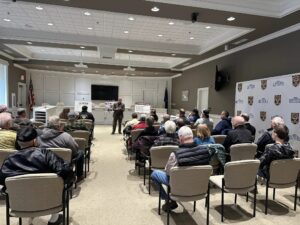
The National Interest Foundation Newsletter
Issue 231, April 5, 2024
Welcome to our NIF Newsletter. This week, we look into the circumstances surrounding Turkish President Recep Tayyip Erdogan’s ruling party’s unprecedented local electoral defeats, analyze how U.S. Representative Tim Walberg (R-MI) has become the latest Republican Congressmember to draw rebuke for alarming remarks regarding the War on Gaza after suggesting that the enclave be treated “like Nagasaki and Hiroshima” rather than be provided with humanitarian aid, and examine how Wisconsin’s ‘uninstructed’ protest votes serve as yet another warning to the Biden campaign regarding dissatisfaction with his handling of the War on Gaza.
Turkish President Erdogan’s Ruling Party Suffers Unprecedented Local Electoral Defeats

Erdogan had campaigned vigorously for his party’s candidates, but was foiled across the country and in Turkey’s five biggest cities. (Photo from Getty Images)
Turkish President Erdogan’s Ruling Party Suffers Unprecedented Local Electoral Defeats
An unexpected blow was dealt to Turkey’s President Recep Tayyip Erdogan in recent local elections, in which the country’s main opposition party achieved a monumental upset. The party won majorities in key areas of Turkey, shifting the political landscape across the country in their favor. The opposition party, known as the Republican People’s Party (CHP), had received 37.8% of the overall vote – handing Erdogan’s ruling Justice and Development Party (AKP) a defeat as they had received 35.5% of the overall vote. This is the AKP’s worst defeat in its 22-year history. Furthermore, according to The Economist, these figures in their totality mask the truly sizable nature of the CHP’s victories in Turkey’s largest cities, where the win margins were particularly significant. In Istanbul, Ekrem Imamoglu, the city’s CHP incumbent mayor, trounced his AKP rival by winning 51.1% of the vote to his opponent’s 39.6%. Additionally, in Ankara, Turkey’s capital and second-biggest city, the CHP incumbent mayor Mansur Yavas utterly defeated his AKP opponent by 29 percentage points. The CHP also made important inroads in regions near the Black Sea and central Anatolia, traditionally areas under the AKP’s sphere of influence. In this way, these elections are deemed to hold important implications for the political landscape of Turkey. In fact, Evren Balta, a professor at Ozyegin University, expressed that “the electoral map of Turkey has been transformed,” emphasizing that this election cycle marks a departure in Turkey’s political structure and forebodes possible changes down the line.
These local elections were a surprising turn of events considering that Erdogan had just consolidated his power in last year’s general elections, and the latest results may expose a slip in his hold on power. Experts contend that they symbolize a wider dissatisfaction with Erdogan and the status quo, providing a gauge for both the president’s support and the opposition’s durability. This signals a potential turning of the tide in Turkish politics, as it marks the first time since Erdogan came into power that his party was defeated at the ballot box nationwide. Critics suspect that if his party had succeeded, it would have encouraged him to amend the constitution so that he could alter the term limits on the presidency. However, the election results demonstrated public discontent with Erdogan, indicating that such actions would likely be resisted. Another important insight gained from these elections is the revelation that political competition may be possible in Turkey. The election highlights the emergence of a Turkish political party that can oppose the AKP, a development that many analysts hope will have a positive effect on the country’s democracy.
For some CHP supporters, the latest election results established candidates for the next general election that may have a chance when running against Erdogan. Various observers believe that the CHP did not fare well in last year’s general election due to the candidate they put forth against Erdogan. This election, however, has solidified CHP Leader Ozgur Ozel and Istanbul Mayor Ekrem Imamoglu as potential rivals to Erdogan, paving a clear path for the CHP to run in the 2028 presidential election. Erdogan himself was a former mayor of Istanbul, and formed a brand of populist nationalism which helped capitulate him to prominence. Istanbul is an important city, as it is home to 20% of Turkey’s population and produces more than 30% of the country’s economic output – including trade, tourism, and finance – making it an excellent breeding ground for up-and-coming politicians. In a speech given after his victory, Imamoglu told his supporters “Starting from tomorrow, Turkey will be a different Turkey. You opened the door to the rise of democracy, equality, and freedom…You ignited hope at the ballot box.” The speech appeared to serve as a signal of optimism for the Turkish people that their democracy was alive and well. In response to the defeat, President Erdogan acknowledged that the election had not gone as he had hoped, and promised that he would make changes so that voters were satisfied with his performance.
The evident improvement in the election results for the CHP has much to do with the economic downturn experienced in Turkey. Despite interest rate increases of more than 40%, the annual inflation in Turkey is approaching 70%, an issue that is compounded by Erdogan’s inability to offer further economic concessions to his voters. This economic pain seems to be a notable sticking point for voters, and may have driven some AKP members away from casting their ballots. Another factor that played a role in the upset was the strong showing of New Welfare, an Islamist party that drew votes away from AKP candidates due to voters’ disillusionment with the party. The CHP, under new leadership, also attracted many voters by building broader coalitions and identifying more closely with their voter base. The results stand in the face of Erdogan and the AKP’s extensive grip on the machinery of the state and the media. Imamoglu conveyed his hope that the latest election results would serve as an example of how opposition parties and voters can unseat politicians despite a regime’s suspected illiberal practices, commenting that the election “marks the end of democratic erosion in Turkey and the resurgence of democracy…people oppressed under authoritarian regimes now turn their gaze to Istanbul.” Experts argue that Turkey’s political horizons have been broadened as a result of these recent elections, and that the increased competition witnessed could mean an evolved governmental landscape for the country.
Walberg Becomes the Latest Republican Congressmember to Draw Rebuke for Alarming Remarks on Gaza

U.S. Representative Walberg made the comments at a recent town hall meeting in Dundee, Michigan. (Photo from Village of Dundee Michigan Facebook Page)
Walberg Becomes the Latest Republican Congressmember to Draw Rebuke for Alarming Remarks on Gaza
During a recent town hall meeting in Michigan, U.S. Representative Tim Walberg (R-MI) made controversial and reprehensible comments regarding the War on Gaza when he suggested that the besieged Palestinian enclave should be treated “like Nagasaki and Hiroshima” rather than be provided with much-needed humanitarian aid. In doing so, Walberg regrettably became just the latest Republican Congressmember to elicit condemnation from civil rights and social justice groups for shocking statements about what is taking place in Gaza. Other federal elected officials such as U.S. Representative Andy Ogles (R-TN) and U.S. Representative Brian Mast (R-FL) have also made heinous remarks over the past six months since the onset of the War on Gaza, dehumanizing the Palestinian civilian population and the immense suffering that they have endured due to Israel’s indiscriminate bombardment. In response to Walberg’s town hall comments, organizations including both The Council on American–Islamic Relations (CAIR) and The American Human Rights Council (AHRC) denounced the deeply troubling remarks.
Video footage began to circulate online this past weekend which was taken at the town hall meeting. In it, Congressman Walberg can be seen discussing the War on Gaza. Upon being asked a question from an attendee regarding President Biden’s plans to build a temporary Mediterranean pier to provide humanitarian aid to civilians in Gaza, Walberg can be heard saying “It’s Joe Biden’s reason [that] we need to get humanitarian aid into Gaza. I don’t think we should…We shouldn’t be spending a dime on humanitarian aid. It should be like Nagasaki and Hiroshima. Get it over quick,” a clear reference to the two atomic bombs dropped on Japan during World War II. Regardless of whether or not Walberg was directly insinuating usage of atomic bombs on Gaza, the mere disregard that his remarks show for the humanity of Palestinians and the value of their lives is abhorrent. He is callously expressing that not a sliver of humanitarian aid should be provided to a civilian population that is suffering the horrendous consequences of a brutal military assault, through no fault of their own, particularly when there is ample evidence that Israel is committing egregious war crimes and human rights violations in Gaza.
Sadly, Walberg is far from the only Republican Congressmember to make dehumanizing remarks towards Palestinian civilians in the time since Israel’s destructive War on Gaza began. Back in November of last year, U.S. Representative Brian Mast (R-FL) disturbingly compared Palestinian civilians to Nazis and implied that they are all guilty for the actions of Hamas, adding that “It is not a far stretch to say there are very few innocent Palestinian civilians.” Then in February, Mast even questioned the innocence of babies killed in Gaza when confronted by Code Pink activists outside of his office, saying that Palestinian babies killed in Gaza “are not innocent civilians.” U.S. Representative Andy Ogles (R-TN) also evoked outrage back in February when he responded to an activist’s question about the deaths of Palestinian children in Gaza by remarking that “we should kill them all.” The activist had stated that “I’ve seen the footage of shredded children’s bodies…That’s my taxpayer dollars that are going to bomb those kids,” and Ogles replied “You know what? So, I think we should kill them all if that makes you feel better.”
Dehumanizing and dismissive comments like those of the aforementioned elected officials are dangerous, as they fuel bigotry and create a hateful narrative regarding the value of Palestinian lives. Attempting to conflate Palestinian civilians, including even children, with factions like Hamas is wrong, and it only serves to incite more intolerance and numb people to the colossal degree of Israel’s human rights violations in Gaza. Many of those that have been killed and injured are civilians that have been trapped in unimaginable circumstances beyond their control, and thus the statements from Walberg, Mast, and Ogles exhibit a complete indifference to human suffering. Thankfully, there are rights and social justice organizations that are doing their part to condemn these types of remarks, but federal lawmakers themselves should formally censure their colleagues who engage in this behavior in order to send a strong message that harmful rhetoric like this will not be accepted.
Wisconsin’s ‘Uninstructed’ Protest Votes Serve as Yet Another Warning to the Biden Campaign

The ‘uninstructed’ campaign in Wisconsin is part of a national movement whereby citizens are using their vote to voice displeasure with President Biden’s handling of the War on Gaza. (Photo from WUWM)
Wisconsin’s ‘Uninstructed’ Protest Votes Serve as Yet Another Warning to the Biden Campaign
In this week’s Wisconsin Democratic presidential primary election, a group of nearly 50,000 people voted ‘uninstructed’ in protest of President Biden’s handling of the War on Gaza – yet another warning to the Biden campaign regarding the significant level of dissatisfaction surrounding this. The ‘uninstructed’ movement in Wisconsin is part of a wider national effort whereby citizens are using their vote to voice displeasure. This statewide push was undertaken by a group called ‘Listen to Wisconsin,’ whose original goal was to garner at least 20,000 votes – a number representative of Biden’s margin of victory in the 2020 U.S. presidential election. Their hopes were far exceeded having gained 48,162 votes, nearly two-and-a-half times the 2020 margin, in what amounts to over 8% of the total Democratic vote. With such slim margins of victory expected again this November in battleground states like Wisconsin, the primary results send a powerful message to Biden that he is at serious risk of losing important states that helped get him elected back in 2020.
While the number of ‘uninstructed’ votes were a good showing in the Wisconsin primary, it did not pass the 15% threshold needed to secure any delegates at the Democratic National Convention. However, leaders with the overall national movement itself have secured delegates from results in other states, an accumulated total of 26 of them, which will allow for representation at the upcoming Democratic National Convention in August. This form of electoral protest has been a common occurrence in various Democratic primaries across the nation, with voters casting ‘uncommitted’ or ‘uninstructed’ as a show of discontent with Biden’s stance on Gaza. The national movement was brought about in Michigan’s Democratic presidential primary, which saw an astounding 101,604 – around 13% of participants – vote ‘uncommitted.’ This campaign differentiates itself from the ‘Abandon Biden’ movement, in that the former focuses on persuading Biden to shift his stance through the use of primary results, while the latter has outright pledged to not vote for Biden in the general election. Michigan’s actions started a chain reaction of similar primary protests, including in Minnesota where approximately 45,000 (19%) of Democratic primary voters chose ‘uncommitted.’ When the protest vote movement caught on, the architects of the Michigan campaign organized to support others, including in Wisconsin. The three states of Wisconsin, Michigan, and Minnesota account for 35 total Electoral College votes, with the first two in particular being critical swing states, meaning that neither Biden nor Trump can afford to lose all three states in the general election.
Other states including Hawaii, Washington, North Carolina, Massachusetts, Colorado, Connecticut, and Rhode Island have also had impactful ‘uncommitted’ turnouts. Michigan organizer Lexi Zeidman estimates that in total, the movement has generated around 500,000 votes nationwide, speaking to its significance. The relevance of the movement is especially evident in Michigan and Wisconsin, as experts consistently agree that both states could prove vital to Biden’s re-election chances in 2024. Both Wisconsin and Michigan are considered major battleground states that can easily make or break a presidential candidate’s campaign, and the significant number of votes behind the protests in each state certainly have the potential to do just that. The primary results in the three states of Wisconsin, Michigan, and Minnesota in particular demonstrate that the Gaza issue is of great salience to many Democrats. Analysts have warned that merely being an alternative to Trump will not be enough to convince certain constituents to vote for Biden, because as one commentator put it, “you cannot weaponize fear of Trump against the very real actions of Biden.”
The ‘uncommitted’ movement is part of growing criticism towards Biden’s handling of the War on Gaza, and calls for a full ceasefire to end the conflict. The Biden administration, seemingly in reaction to growing domestic criticism like this, has rolled back some of its support to Israel, at least rhetorically. The president and several high-ranking U.S. officials have made public statements on the importance of protecting civilian life and delivering more humanitarian aid. However, critics point out that the president continues to contribute to Israel’s human rights violations and war crimes by failing to put a halt to weapons and munitions transfers to Israel. Through the ‘uncommitted’ movement, many voters have made it clear that words alone will not be enough. States like Wisconsin and Michigan hold substantial weight in presidential elections, and thus Biden would be wise to take note of what a potentially consequential number of voters there are telling him.
Enter the text or HTML code here
